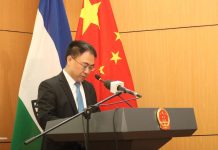Africa-Press – Lesotho. Welcome to Public Finance 101. This will be a regular column in Public Eye’s business section. According to the consolidated financial statements in the Report Of The Auditor General as at 31 March 2018, (page74), under the title, ‘The financial position of the Government of Lesotho’, against the capital budget of around M5 billion committed for national development, only about M3 billion was committed to developmental national projects.
This means a residual capital budget of around M2 billion remained unused, amidst a mountain of social, economic, educational and health sector ills in Lesotho.
While multiple households remain in dire need of urgent food subsidies as the country’s economy registers a dreadfully slow growth, and teachers and health practitioners complain of poor remuneration, M2 billion remains untouched in government coffers.
Meanwhile, between 35 and 40 percent of our newly skilled and educated labour force roams Kingsway jobless. Downgraded agriculture resulting from climate change and harsh conditions has eroded grain and livestock production.
In some cases you find a single farmer having lost 200 sheep due hunger. At the same time there are reports that government officials have helped themselves to M200 million from the National Contingency Fund, according to reports from The Public Accounts Committee 2019.
Public Finance is the heart beat that of economic, social, educational, health, environmental sustainability, to be managed on behalf of those who elected public officials into power. Public finance speaks of the responsibilities each government assumes for its inhabitants.
It echoes narratives about the accountability of government and the commitment each government must reflect in its dealings with public finances, where transparency and consistent financial reporting to the public remains pivotal.
It is the right and responsibility of every civilian to know and have a say on how government runs its fiscal affairs. As a custodian of every citizen’s finances, government owes accountability, commitment and consequential responsibility to its electorate in the deployment of financial resources.
The public have a right to intrinsic information about how their government accumulates money to run public services, they have a right to know the highs and lows of how government uses fiscal resources and conditions under which each compelling government financial transaction was made.
The Office of the Auditor General, as in accordance with Section 117(4) of the Constitution of Lesotho 1993 together with Section 27 of the Audit Act of 2016, is mandated under these provisions to submit reports of consolidated financial statements of the government of Lesotho to the ministry of Finance to be tabled before the Parliament of Lesotho.
The consolidated financial statements of the government of Lesotho must be the most important document to sway and monitor the developmental and fiscal affairs of the mountain kingdom.
Its ordinances, together with the constitution of the country must be made accessible in plain language for every Mosotho, including the ones in the rural areas of Lesotho.
The citizens must be included and afforded sound rationale for each fiscal state of affairs in their country and be afforded the liberty to formulate their conclusions and convictions.
Every Mosotho is owed a simple explanation about the nuts and balls around the Southern African Custom Union (SACU) and the role of taxes towards the capital and recurrent, including what that whole jargon means. The capital and recurring budget must be watered down and explained in day-to-day language.
According to the March 31, 2018 auditor general’s report, Lesotho was saddled with a staggering M12 billion worth of debt from which around M1.9 billion was from domestic debts, with about M10 billion from external debt.
The public must be taught what donor funding is, and the corners around state loans must be navigated and details attached to those loans must be made plain to those who own the funds (the public).
The public’s understanding about National Reserves and the mandate of the Central Bank of Lesotho must be made clear with less technical language that could impede communication.
It was for these reasons that ACT (Accountable-Committed-Together) was established as a public finance management system for non-governmental organisations. Its vision and mandate is to break the barriers and limitations of access to fiscal information about public finance, management and usage.
We therefore aim to educate the public about how the state’s management and usage of funds affects the socio-economic and political climate in both rural and urban Lesotho.
To us, the year 2020 marked a turning point in many respects. Domestic and international headlines were made for all the wrong reasons. Among the common issues includes failed leadership, a struggling judicial system, an ailing health system and soaring unemployment.
Ironically year 2020 was supposed to be the culminations of Vision 2020 as inaugurated 17 years before by former Lesotho’s Premier Dr Pakalitha Bethuel Mosisi.
Vision 2020 aspired to see Lesotho mounting stable democratic foundations for a prosperous nation, a nation at peace with itself and its neighbours with a well-managed environment and established technology.
That was in 2003. October 4, 2016, marked 50 years of Lesotho’s independence. Lesotho’s Silver Jubilee should have been a pivotal day on which grim reflections ought to have been made, looking back into history for lessons learned from failures and successes to build on.
On the contrary, we wined and dined, sweeping under the red glowing carpet substantive matters that needed our attention and robust confrontation. We tiptoed around uncomfortable issues hoping they never raise their ugly heads from beneath where we buried them.
In the process we completely missed an opportunity. From our mountain water springs flows part of Africa’s purest water which could put us on the world map if commercially explored and exploited.
Our wool and mohair contribute a staggering M300 to M400 million into Lesotho’s economic value chain. Our diamonds high quality unique diamonds are a marvel to the world.
We produced the fifth largest diamond (910-carat) in the world in 2018 valued at US$40 million (about M600 million); the sizes of our rare gems keeps the world on its toes.
The 2019 World Bank poverty report paints a gloomy image of Lesotho’s struggle to keep her nose above the muddy poverty waters with about 500 000 or more of her inhabitants living far below the poverty line and in need of urgent food subsidies.
Aggravated by the advent of the COVID-19 pandemic which relegated other diseases to the back of the priority, HIV and Aids is far from over with new infections in the youth population rising.
On top of all this is climate change which threatens to wipe out the citizens’ subsistence capacity to produce food, especially in the more arid southern part of the country.
The economy is bleeding profusely, our youth are jobless and hungry, crime is on the rise, while incidents of police brutality remain vivid all the time and poor infrastructure continues to crumble with the education system are on their knees.
The government’s coffers are running low, with a soaring wage bill, worsened by maladministration of state funds, poor financial reporting systems and corruption.
ACT believes that foundations make what nations become and in our case, public finance management is the first place to look into in trying to put our house in order as a nation. Basotho, let’s have a conversation
Contact: (00266) 58901027 (Whatsapp)
(00266)62901027
Email:
mlephallo@gmail. com
For More News And Analysis About Lesotho Follow Africa-Press






